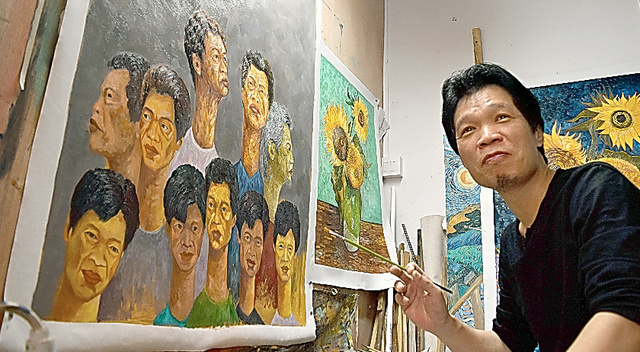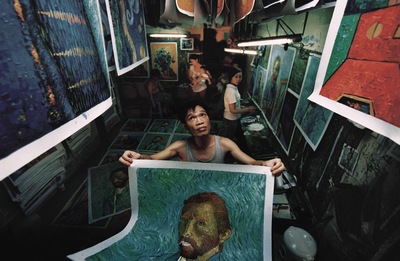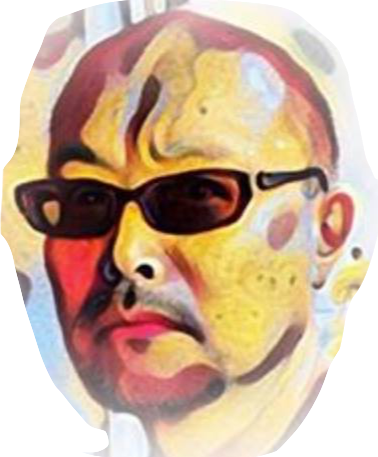Van Gogh on
demand
ゴッホ・オン・デマンド
The Art ensemble of Global
Anthropology


Van Gogh on
demand
ゴッホ・オン・デマンド
The Art ensemble of Global
Anthropology


The sky above the port was the color of television, tuned to a dead channel. - William Gibson, Neuromancer, 1984「港の空の色は、空きチャンネルの合わせたTVの色だった」(黒丸尚 訳)
■Van Gogh on Demand, by Winnie Won Yin Wong, University of Chicago Press, 2013
 『中國梵髙』→
『中國梵髙』→
"Dear
Theo, I'm
walking toword place that I thought was very close, but perhaps it is
very far away" - Vincent van Gogh.
In the Guangdong province in southeastern China lies Dafen(大芬村), a village that houses thousands of workers who paint Van Goghs, Da Vincis, Warhols, and other Western masterpieces, producing an astonishing five million paintings a year. To write about life and work in Dafen, Winnie Wong infiltrated this world, investigating the claims of conceptual artists who made projects there; working as a dealer; apprenticing as a painter; surveying merchants in Europe, Asia, and America; establishing relationships with local leaders; and organizing a conceptual art show for the Shanghai World Expo. The result is Van Gogh on Demand, a fascinating book about a little-known aspect of the global art world - one that sheds surprising light on our understandings of art, artists, and individual genius. Confronting difficult questions about the definition of art, the ownership of an image, and the meaning of imitation and appropriation, Wong shows how a plethora of artistic practices joins Chinese migrant workers, propaganda makers, and international artists together in a global supply chain of art and creativity. She examines how Berlin-based conceptual artist Christian Jankowski, who collaborated with Dafen's painters to reimagine the Dafen Art Museum, unwittingly appropriated a photojournalist's intellectual property. She explores how Zhang Huan, a radical performance artist from Beijing's East Village, prompted propaganda makers to heroize the female artists of Dafen village. Through these cases, Wong shows how Dafen's workers force us to re-examine our expectations about the cultural function of creativity and imitation, and the role of Chinese workers in redefining global art. Providing a valuable account of art practices in a period of profound global cultural shifts and an ascendant China, Van Gogh on Demand is a rich and detailed look at the implications of a world that can offer countless copies of everything that has ever been called "art." - Nielsen BookData.
「中
国南東部の広東省にある大芬村は、ゴッホ、ダ・ヴィンチ、ウォーホルズなど西洋の名画を描く何千人もの労働者が住み、年間500万枚という驚くべき数の絵
画を制作している。大芬での生活と仕事について書くために、ウィニー・ウォンはこの世界に潜入し、そこでプロジェクトを行ったコンセプチュアル・アーティ
ストたちの主張を調査し、ディーラーとして働き、画家として弟子入りし、ヨーロッパ、アジア、アメリカの商人を調査し、地元の指導者たちと関係を築き、上
海万博のコンセプチュアル・アート・ショーを企画した。その結果、『ゴッホ・オン・デマンド』は、世界のアート界のあまり知られていない一面について書か
れた魅力的な本となった。アートの定義、イメージの所有権、模倣と流用の意味といった難問に立ち向かいながら、ウォンは、中国の出稼ぎ労働者、プロパガン
ダ制作者、国際的アーティストが、アートと創造性のグローバル・サプライ・チェーンの中で、いかに多くの芸術的実践を結びつけているかを示している。ベル
リンを拠点に活動するコンセプチュアル・アーティスト、クリスチャン・ヤンコフスキが、大芬美術館を再構築するために大芬の画家たちと協力した際、知らず
知らずのうちにフォトジャーナリストの知的財産を流用していたことを検証。また、北京のイースト・ヴィレッジ出身の過激なパフォーマンス・アーティスト、
チャン・フアンが、大芬村の女性アーティストを英雄視するようプロパガンダ制作者に促した経緯についても探求している。これらの事例を通して、ウォンは大
芬の労働者たちが、創造性と模倣の文化的機能、そしてグローバル・アートの再定義における中国人労働者の役割について、私たちの期待をいかに再検討させる
かを示している。世界的に文化が大きくシフトし、中国が台頭している時代におけるアートの実践について貴重な証言を提供する『ゴッホ・オン・デマンド』
は、これまで "アート "と呼ばれてきたあらゆるもののコピーを無数に提供できる世界が持つ意味について、豊かで詳細な考察を展開している。」
Van Gogh on Demand, by Winnie Won Yin Wong, University of Chicago Press, 2013/ ゴッホ・オンデマンド : 中国のアートとビジネス / W.W.Y.ウォング著 ; 松田和也訳, 青土社 , 2015
章立て
解説
序 手本に倣って
第1章 巨大絵画工場をイメージする
第2章 コンセプチュアル・アーティストと複製画家
第3章 モデル・ボヘミアにおける真の芸術と真の愛
第4章 18.「Vincent」と署名
第5章 「作者」のフレーミング—コンセプチュアリズムと大芬レディメイド
結語 コンセプチュアル絵画、中国夢想
++


趙小勇(チャオ・シャオヨン)
1972年、中国湖南省邵陽出身。1996年から、大芬油画村でゴッホの油絵の複製画を制作する。2013年にアムステルダムで本物のゴッホの油絵を観た
ことをきっかけに、自身もオリジナル作品を描いて生きていこうと決意する。
藝術家趙小勇:複製西方經典
Who is
the painter of satire of
coronavirus shopping panic by using Munch' Scream ? - I suppose the
painter from Dàfēn.
谁是使用爱德华 蒙克「吶喊」讽刺冠状病毒购物狂的画家? - 我想是达芬的画家。
The Task of the Translator - by Walter Benjamin.
"In them the life of the originals attains its latest, continually renewed, and most complete unfolding."
"Thus, ironically, translation
transplants the original into a more definitive linguistic realm, since
it can no longer be displaced by a secondary rendering."
http://users.clas.ufl.edu/burt/deconstructionandnewmediatheory/walterbenjamintasktranslator.pdf
リンク
文献
その他の情報
Copyleft, CC, Mitzub'ixi Quq Chi'j, 1997-2099
For all undergraduate students!!!, you do not paste but [re]think my
message.


Remind Wittgenstein's phrase, "I should not like my writing to spare
other people the trouble of thinking. But, if possible, to stimulate
someone to thoughts of his own," - Ludwig Wittgenstein